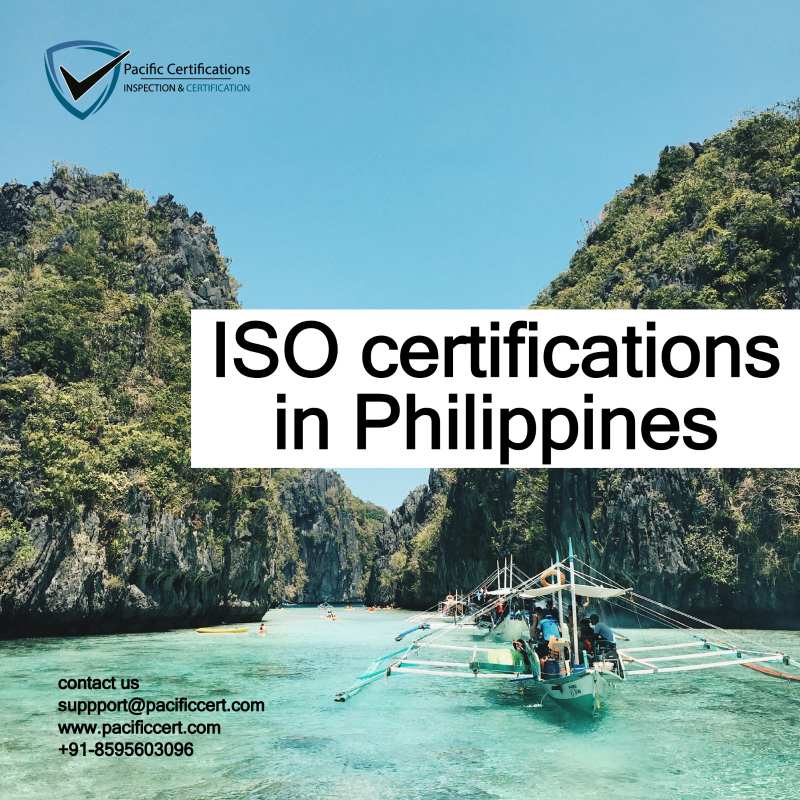ISO Certifications in Philippines, Popular standards, Requirements and Benefits

ISO certifications are widely recognized and sought after in the Philippines, as they demonstrate an organization's commitment to quality, environmental management, occupational health and safety, information security, and other areas. Here are some key ISO certifications commonly pursued by organizations in the Philippines:
ISO 9001 (Quality Management System):
This standard focuses on ensuring that organizations meet customer requirements and continuously improve their processes and products/services.
ISO 14001 (Environmental Management System):
Aimed at helping organizations minimize their environmental impact, ISO 14001 provides a framework for implementing an effective environmental management system.
ISO 45001 (Occupational Health and Safety Management System):
Formerly known as OHSAS 18001, ISO 45001 sets out requirements for occupational health and safety management systems, helping organizations provide a safe and healthy workplace for employees.
ISO 27001 (Information Security Management System):
With the increasing importance of data security, ISO 27001 helps organizations establish and maintain an effective information security management system to protect sensitive information.
ISO 22000 (Food Safety Management System):
Particularly relevant for organizations in the food industry, ISO 22000 outlines requirements for ensuring food safety throughout the supply chain.
ISO 50001 (Energy Management System):
This standard helps organizations establish systems and processes to improve energy performance, reduce energy costs, and lower greenhouse gas emissions.
ISO 13485 (Medical Devices Quality Management System):
For organizations involved in the design, production, and distribution of medical devices, ISO 13485 provides a framework for ensuring quality and regulatory compliance.
ISO 20000 (IT Service Management System):
Aimed at IT service providers, ISO 20000 sets out requirements for establishing, implementing, and maintaining an effective IT service management system.
ISO 17025 (Testing and Calibration Laboratories):
Relevant for testing and calibration laboratories, ISO 17025 specifies requirements for quality management systems to ensure the accuracy and reliability of test results.
ISO 31000 (Risk Management):
While not a certifiable standard like the others, ISO 31000 provides guidelines for implementing an effective risk management framework to identify, assess, and mitigate risks across an organization.
Click here to find out more applicable standards to your industry
Organizations in the Philippines can obtain ISO certifications by ensuring that their management systems meet the requirements of the respective ISO standards. Achieving certification demonstrates compliance with international best practices and can enhance credibility and competitiveness in the global market.
Requirements of ISO Certifications in Philippines
The requirements for obtaining ISO certifications in the Philippines are generally aligned with the international standards set by the International Organization for Standardization (ISO). Here are the common steps and requirements for obtaining ISO certifications in the Philippines:
Understanding ISO Standards: The first step is to understand the specific ISO standard(s) applicable to your organization's industry and objectives. This involves familiarizing yourself with the requirements, processes, and benefits associated with the chosen standard(s).
Gap Analysis: Conduct a gap analysis to identify areas where your organization's current practices align with the requirements of the chosen ISO standard(s) and areas where improvements are needed.
Documentation Preparation: Develop or update documentation to establish and maintain the required management system. This may include quality manuals, procedures, work instructions, forms, and records specific to the ISO standard(s) being pursued.
Implementation: Implement the documented management system throughout the organization, ensuring that all relevant personnel are trained and aware of their roles and responsibilities.
Internal Audit: Conduct internal audits to assess the effectiveness of the implemented management system and identify any non-conformities or areas for improvement.
Management Review: Hold management reviews to evaluate the performance of the management system, identify opportunities for improvement, and ensure alignment with organizational objectives.
Certification Body Selection: Choose an accredited certification body to conduct the external audit and certification process. In the Philippines, organizations may work with certification bodies accredited by local accreditation bodies or international accreditation bodies recognized in the country.
External Audit: The certification body will conduct an external audit to assess the organization's compliance with the requirements of the ISO standard(s). This typically involves a stage 1 audit (documentation review) followed by a stage 2 audit (on-site assessment).
Certification Decision: Based on the audit findings, the certification body will make a decision regarding certification. If all requirements are met, the organization will be awarded the ISO certification(s).
Surveillance Audits: After certification, the organization will be subject to periodic surveillance audits to ensure ongoing compliance with the ISO standard(s). These audits typically occur annually or as specified by the certification body.
It's important to note that the requirements and processes for obtaining ISO certifications may vary slightly depending on the specific ISO standard(s) being pursued and the certification body chosen. Organizations in the Philippines should work closely with their chosen certification body to ensure a smooth and successful certification process.
Benefits of ISO Certifications in Philippines
Obtaining ISO certifications in the Philippines offers numerous benefits to organizations across various industries. These benefits can contribute to improved operational efficiency, enhanced credibility, increased competitiveness, and better overall performance. Here are some of the key benefits of ISO certifications in the Philippines:
Enhanced Credibility and Reputation:
ISO certifications demonstrate an organization's commitment to quality, environmental sustainability, occupational health and safety, information security, or other relevant areas. This enhances the organization's credibility and reputation among stakeholders, including customers, partners, regulators, and the public.
Improved Quality Management:
ISO 9001 certification, for example, helps organizations establish and maintain effective quality management systems, leading to improved product and service quality, fewer defects, and enhanced customer satisfaction.
Increased Market Access and Global Opportunities:
ISO certifications are internationally recognized, allowing certified organizations in the Philippines to access global markets more easily. ISO certification can be a requirement for participating in certain tenders, contracts, or supply chains, opening up new business opportunities.
Compliance with Regulatory Requirements:
ISO certifications often align with or exceed regulatory requirements in the Philippines and other countries. Achieving certification demonstrates compliance with industry standards and regulations, reducing the risk of non-compliance and associated penalties.
Cost Savings and Efficiency Improvements:
Implementing ISO-certified management systems can lead to cost savings through improved process efficiency, waste reduction, and better resource utilization. ISO 14001 certification, for instance, helps organizations minimize environmental impacts and reduce operating costs.
Enhanced Risk Management:
ISO standards such as ISO 31000 (Risk Management) provide a framework for identifying, assessing, and mitigating risks across the organization. Certification in risk management helps organizations in the Philippines anticipate and respond effectively to potential threats and opportunities.
Better Occupational Health and Safety Practices:
ISO 45001 certification helps organizations prioritize employee health and safety, reducing workplace accidents, injuries, and illnesses. This leads to a healthier and more productive workforce and can result in lower insurance premiums and absenteeism rates.
Improved Information Security:
ISO 27001 certification demonstrates an organization's commitment to protecting sensitive information and managing cybersecurity risks effectively. This is particularly important in today's digital age, where data breaches and cyberattacks are significant concerns.
Continuous Improvement Culture:
ISO certifications promote a culture of continuous improvement within organizations. By adhering to the principles of the Plan-Do-Check-Act (PDCA) cycle, certified organizations in the Philippines can identify opportunities for enhancement and strive for ongoing excellence.
Stakeholder Confidence and Trust:
ISO certifications provide assurance to customers, investors, employees, and other stakeholders that the organization operates in accordance with internationally recognized best practices. This builds trust and confidence in the organization's products, services, and processes.
Overall, ISO certifications offer tangible benefits for organizations in the Philippines seeking to enhance their competitiveness, sustainability, and overall performance in today's global marketplace.
Which Industries need ISO Certifications in Philippines
ISO certifications are relevant and beneficial to organizations across various industries in the Philippines. While the specific ISO standards required may vary depending on factors such as industry regulations, customer requirements, and organizational objectives, many sectors can benefit from implementing ISO-certified management systems. Here are some industries in the Philippines where ISO certifications are commonly pursued:
Manufacturing:
Manufacturing industries in the Philippines, including automotive, electronics, food and beverage, pharmaceuticals, and textiles, often seek ISO certifications such as ISO 9001 (Quality Management System), ISO 14001 (Environmental Management System), ISO 45001 (Occupational Health and Safety Management System), and ISO 22000 (Food Safety Management System) to enhance product quality, environmental sustainability, workplace safety, and regulatory compliance.
Construction:
Construction companies in the Philippines may pursue ISO certifications such as ISO 9001 (Quality Management System) and ISO 45001 (Occupational Health and Safety Management System) to ensure quality construction processes, promote worker safety, and meet regulatory requirements.
Healthcare:
Hospitals, clinics, and healthcare facilities in the Philippines may seek ISO certifications such as ISO 9001 (Quality Management System) and ISO 13485 (Medical Devices Quality Management System) to improve patient care, enhance operational efficiency, and ensure compliance with quality and safety standards.
Information Technology (IT) and Software Development:
IT companies and software development firms in the Philippines may pursue ISO certifications such as ISO 27001 (Information Security Management System) and ISO 20000 (IT Service Management System) to protect sensitive data, ensure data security, and provide high-quality IT services to clients.
Hospitality and Tourism:
Hotels, resorts, and tourism-related businesses in the Philippines may seek ISO certifications such as ISO 9001 (Quality Management System) and ISO 22000 (Food Safety Management System) to enhance guest satisfaction, improve service quality, and ensure food safety and hygiene standards.
Transportation and Logistics:
Transportation and logistics companies in the Philippines may pursue ISO certifications such as ISO 9001 (Quality Management System) and ISO 14001 (Environmental Management System) to optimize transportation processes, minimize environmental impact, and ensure customer satisfaction.
Energy and Utilities:
Energy companies, including power generation, distribution, and renewable energy firms in the Philippines, may seek ISO certifications such as ISO 50001 (Energy Management System) to improve energy efficiency, reduce costs, and meet sustainability goals.
Banking and Financial Services:
Banks, financial institutions, and insurance companies in the Philippines may pursue ISO certifications such as ISO 27001 (Information Security Management System) to protect sensitive financial data, prevent cyber threats, and ensure compliance with regulatory requirements.
Education and Training:
Educational institutions and training providers in the Philippines may seek ISO certifications such as ISO 9001 (Quality Management System) to enhance the quality of education and training programs, improve student satisfaction, and ensure continuous improvement.
Agriculture and Food Processing: Agricultural producers, food processors, and exporters in the Philippines may pursue ISO certifications such as ISO 22000 (Food Safety Management System) and ISO 9001 (Quality Management System) to ensure food safety, quality, and traceability throughout the supply chain.
These are just a few examples of industries in the Philippines where ISO certifications are valuable for enhancing organizational performance, meeting regulatory requirements, and gaining a competitive edge in the marketplace. Ultimately, any industry that prioritizes quality, safety, environmental sustainability, information security, or other relevant aspects can benefit from implementing ISO-certified management systems.
Contact Us
Pacific Certifications is accredited by ABIS, in case you need support with ISO certification in Philippines, please contact us at [email protected] or +91-8595603096.
Ready to get ISO 14001:2015 certified?
Contact Pacific Certifications to begin your certification journey today!
Suggested Certifications –
Read more: Pacific Blogs

